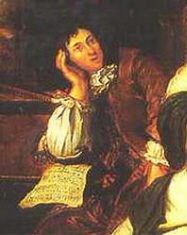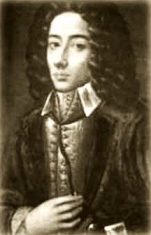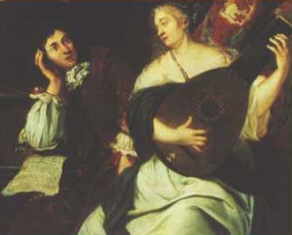|
Dietrich Buxtehude (Composer) |
|
Born: c1637 - Oldesloe, near Lübeck, Schleswig-Holstein, Germany
Died: May 9, 1707 - Lübeck, Germany |
|
Dietrich [Diderik Hansen] Buxtehude was an organist and composer of the Baroque period. Not only the year, but also the country of his birth is uncertain and disputed. Since he spent his early years in Helsingborg in Skåne, at the time part of Denmark, he is by some considered a Danish composer. Others, however, claim that he was born at Oldesloe in the Duchy of Holstein, (now Germany), which at that time was a part of the Danish Monarchy. Later in his life he Germanized his name, his new name being Dietrich Buxtehude. His early youth and birthplace remain a mystery. Most scholars recognize that he studied music with his father, Johann, who had a great influence on him.
Dietrich Buxtehude was the organist at the Mariekirke in Helsingborg (1657/1658-1660) and in Helsingør (1660-1668), before moving to Lübeck in April 1668 and becaming organist of Marienkirche (St. Mary's Church), as the successor to Franz Tunder. One of his greatest contributions there was his establishment of "Abendmusik"-evening concerts of organ and choral music held annually the five Sundays before Christmas. His post in the free Imperial city of Lübeck afforded him considerable latitude in his musical career and his autonomy was a model for the careers of later Baroque masters Musicians from northern Germany came to the city to meet the composer and attend his concerts. He was visited by George Frideric Handel in 1703, Johann Mattheson, Georg Philipp Telemann and by J.S. Bach. In 1705, J.S. Bach traveled 200 miles, on foot from Arnstadt to meet the pre-eminent Lübeck organist and hear him play. J.S. Bach did meet him and study for several months in 1705 and 1706. Both G.F. Handel and J.S. Bach wanted to follow Buxtehude at St. Mary's, but neither one wanted to marry his daughter as that was a condition for the position.
Having been born half a century after Heinrich Schütz , the "father of German musicians", and a little less than half a century before J.S. Bach, Dietrich Buxtehude was placed in the unique position of being a living link between the founder of Protestant Baroque music and its greatest master. The road leading from the Kapellmeister at the Dresden court to the organist of St. Mary's, Lübeck, and on to the cantor of the Thomasschule in Leipzig virtually signifies the progress of 17th century German music.
When interest in Buxtehude revived after a long period of oblivion his reputation as the most famous organist in Germany prior to J.S. Bach was the first fact to be remembered. The discovery that he was also an outstanding composer of sacred vocal music, and in that sphere of composition worthy to rank with H. Schütz and J.S. Bach, has only been made in the course of the last few decades.
All his life - first in Helsingborg, later in Elsinore and finally for almost forty years in Lübeck - Buxtehude was employed as organist. He was never a cantor, yet his interest in vocal music was profound. About 120 works of vocal church music have survived, most of them because they were collected by his friend Gustav Düben, a Kapellmeister at the court in Stockholm. Approximately 100 of these compositions were written from 1680 to 1687, the rest during the preceding thirteen years. Nothing is known about music written in the last twenty years of Buxtehude's life. Obviously a large number of his works have been lost, but available evidence shows that vocal music makes up a large proportion of his entire output. It must also be remembered that whilst H. Schütz and J.S. Bach produced music written for voices in the course of their official duties, Buxtehude's corresponding works were, with the possible exception of a few that may have been commissioned, expressions of spontaneous emotion. He used the scriptures as well as church hymns and contemporary or mediaeval sacred poetry as textual sources and treated them either in compact form or in various combinations.
His settings reveal Buxtehude's versatility and personality which made him the unrivalled master of his time. They also show a profusion of musical forms representing different stages in the development of the Spiritual Concerto, ranging from H. Schütz's Symphoniae sacrae to J.S. Bach's early cantatas and, in the case of chorales, from simple song-form to powerful elaborations of textual treatment. His extraordinary powers of imagination were undoubtedly assisted by the contemporary trend of adopting an unconstrained attitude in questions of musical form. Buxtehude was subjected to H. Schütz's influence through the latter's pupils C. Bernhard and Matthias Weckmann, as well as his predecessor in office and father-in-law Franz Tunder. There was, moreover, the more direct influence of Carissimi , acting through Vincenzo Albrici and Gioseppo Peranda, which proved a great stimulus to his pietistic inclination. These varied influences combined with Buxtehude's own passionate imagination, ardour and feeling constitute the elements of his unique personal style. His inventiveness is based on extraordinary simplicity. He had the rare gift of being able to transform a modest substance into a work of great art. Buxtehude's powers of imagination -- they may have been less sophisticated than those of the intellectual H. Schütz but certainly not less fervent -- were sparked-off by his text. The inherent poetry of words inspired him, and listeners will be struck by the resulting warmth, plasticity and irresistible force of his settings. It is surprising how much he achieved using simple devices like word-repetitions or a significant pause. His musical language alters with each new text.
To what extent Buxtehude's vocal church music is liturgical or extraliturgical is a matter of diverse opinion. Delimination of both types of music is difficult, especially in works written during the incipient stage of pietism. Certainly many of his compositions, especially those for solo voices, were meant to be of private devotional character and could be termed 'sacred chamber music.' |
|



|
|
Source: HOASM Website; Classical Net Website (by Mike Parmer, August 2003); Wikipedia Website
Contributed by Aryeh Oron (December 2005) |
|
Dierich Buxtehude : Short Biography | Dietrich Buxtehude & Bach |
|
Works in J.S. Bach's Library |
|
Missa brevisae [unpublished]
Toccata BuxWV 164 G-dur
Quemadmodum desirat cervus |
|
Use of Chorale Melodies in his works |
|
Title |
Chorale Melody |
Year |
|
Ach Gott und Herr, Chorale Prelude for Organ, BuxWV 177 |
Ach Gott und Herr |
|
|
Lost work ? |
Ach wie flüchtig, ach wie nichtig |
|
|
Chorale variations on Auf melieben Gott, BuxWV 179 |
Auf meinen lieben Gott |
|
|
Ach Herr, mich armen Sünder , Chorale Prelude, BuxWV 178 |
Befiehl du deine Wege (I) |
|
|
Christ unser Herr zum Jordan kam , Chorale Prelude for Organ Dorian, BuxWV 180 |
Christ unser Herr zum Jordan kam |
|
|
Chorale Cantata: Das neugeborne Kindelein, for 4 vocal parts, violins, violone, bassoon, bc, BuxWV 13 |
Das neugeborne Kindelein |
|
|
Cantata: Du Friedefürst, Herr Jesu Christ, Cantata for SSATB, 2 Violins, Viola, and bc, BuxWV 20 |
Du Friedefürst, Herr Jesu Christ |
|
|
Cantata: Du Friedefürst, Herr Jesu Christ, for SSB, 2 Violins, 3 Violas, (or 2 Violas + Bassoon) + bc, BuxWV 21 |
Du Friedefürst, Herr Jesu Christ |
|
|
Du Lebensfürst, Herr Jesu Christ SATB 2 violins, 2 violettes, viola ,bc, BuxWV 22 |
Du Lebensfürst, Herr Jesu Christ |
|
|
Chorale prelude for organ in the Dorian mode, Durch Adams Fall ist ganz verderbt, BuxWV 183 |
Durch Adams Fall ist ganz verderbt |
|
|
Puer natus in Bethlehem , Chorale Prelude for Organ, BuxWV 217 |
Ein Kind geborn zu Bethlehem (Puer natus in Bethlehem) |
|
|
Chorale Prelude for organ in G minor, Erhalt uns, Herr, bei deinem Wort, BuxWV 185 |
Erhalt uns, Herr bei deinem Wort |
|
|
Chortale Cantata Erhalt uns, Herr, bei deinem Wort, for SATB chorus, 2 violins, violone or bombarde & continuo, BuxWV 27 |
Erhalt uns, Herr bei deinem Wort |
|
|
Erschienen ist der herrlich Tag , Chorale Prelude for Organ, BuxWV 224 |
Erschienen ist der herrlich Tag |
|
|
Chorale Prelude for organ (with pedal) Es ist das Heil uns kommen her, BuxWV 186 |
Es ist das Heil uns kommen her |
|
|
Gelobet seist du, Jesu Christ, Chorale prelude for organ in G major, BuxWV 188 |
Gelobet seist du, Jesu Christ |
|
|
Gelobet seist du, Jesu Christ, Chorale prelude for organ in G major, BuxWV 189 |
Gelobet seist du, Jesu Christ |
|
|
Herr Christ der einig Gottes Sohn , Chorale Prelude for Organ in G major, BuxWV 191 |
Herr Christ, der einge Gottessohn |
|
|
Herr Christ der einig Gottes Sohn , Chorale Prelude for Organ in G major, BuxWV 192 |
Herr Christ, der einge Gottessohn |
|
|
Jesu, meine Freude , Cantata for SSB, 2 vn, bn, bc, BuxWV 60 |
Jesu, meine Freude |
|
|
Komm, heiliger Geist, Herre Gott , 2 Chorale Preludes for Organ, BuxWV 199 and 200 |
Komm, Heiliger Geist, Herre Gott |
|
|
Kommt her zu mir, spricht Gottes Sohn , Chorale Prelude for Organ in G minor, BuxWV 201 |
Kommt her zu mir, spricht Gottes Sohn |
|
|
Lobt Gott, ihr Christen, allzugleich , Chorale Prelude for Organ, BuxWV 202 |
Lobt Gott, ihr Christen, allzugleich |
|
|
Mit Fried und Freud, Cantata SB with 3 instr. or organ |
Mit Fried und Freud ich fahr dahin |
|
|
Mit Fried und Freud ich fahr dahin, Chorale Prelude for organ |
Mit Fried und Freud ich fahr dahin |
1674 |
|
Nun komm, der Heiden Heiland , Chorale Prelude for Organ, BuxWV 211 |
Nun komm, der Heiden Heiland |
|
|
Nun laßt uns Gott dem Herren , for SATB voices, 2 violins & continuo, BuxWV 81 |
Nun laßt uns Gott dem Herren |
|
|
Vater unser im Himmelreich, Chorale Prelude for Organ BuxWV 219 |
Vater unser im Himmelreich |
|
|
Von Gott will ich nicht lassen , Chorale Prelude for Organ, BuxWV 221 |
Von Gott will ich nicht lassen |
|
|
Cantata Wär Gott nicht mit uns diese Zeit for Soprano, A, T, B |
Wo Gott der Herr nicht bei uns hält |
|
|
Cantata Wo soll ich fliehen hin SATB, 2 violins 2 violas, violone, bc, BuxWV 112 |
Wo soll ich fliehen hin / Auf meinen lieben Gott |
|
|
Links to other Sites |
|
Dietrich Buxtehude (Classical Net)
HOASM: Dietrich Buxtehude
Dietrich Buxtehude - Biographie, Catalogue des oeuvres [French]
Buxtehude: Biography (Sojurn)
DIETRICH BUXTEHUDE, Biography, Discography (Goldberg)
Buxtehude, Dietrich (c. 1637 - 1707) (Naxos) |
Dietrich Buxtehude (c. 1637 - 1707) (Karadar)
San Francisco Bach Choir: Dietrich Buxtehude
Dietrich Buxtehuda (Wikipedia)
Organ Composers: Dieterich Buxtehude
Dietrich Buxtehude (Encyclopædia Britannica)
Buxtehude, Friedrich (Estrella) |